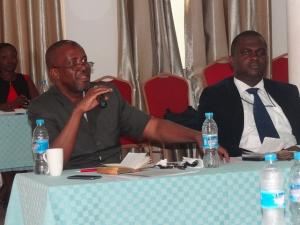WHO and the Ministry of Health conducted a consultative meeting to strengthen community health systems and the 2016/2017 work plan
Juba, 17 February 2016 - The Ministry of Health, and the WHO Country Office, concluded a one-day Consultative Meeting on the Boma Health Initiative (BHI), a strategy adopted by the MoH to strengthen community health systems and the 2016/2017 work plan.
The purpose of the meetings was to generate a common understanding of the WHO approved work plans for 2016/17 biennium, to explain the main deliverables of the WHO work plans for biennium and to agree on WHO strategy and plan of action for implementation of the BHI.
In his opening remarks, Dr Richard Lako, Director General of planning at the Ministry of Health, noted that through the Boma Health Initiative (BHI) and human resource for health, the South Sudan government is pursuing a comprehensive whole-of-government approach to health. The initiative promotes a new business model to deliver dual objectives of achieving significant health improvements and creating an effective, efficient and country-led platform for the sustainable delivery of essential health care and public health programs at the community level. This initiative and the improvement of human resources for health are the flagships of the ministry.
He commended the WHO for organizing the meeting as per the request of the Minister and the Undersecretary for Health. The request was for the purpose of ensuring that the MoH departments understand and own the work plan.
In his keynote address, Dr Abdulmumini Usman, WHO Representative to South Sudan, highlighted the WHO African Region Transformation Agenda, a framework for implementing WHO global reforms towards improved performance and accountability in the African region. The Transformation Agenda was developed through a consultative process with member states, focusing on four areas: pro-results values; smart technical focus; responsive strategic operations and effective communications and partnerships.
Dr Abdulmumini underscored that building on existing programmatic platforms and partnerships, an intensified BHI focus will scale-up activities outlined in the national health sector strategic plan while ensuring that special attention is given to monitoring and evaluation to assess progress and to capture lessons learned.
“Building functioning systems will, in some cases, require a new way of thinking about health investments, with increased attention to the appropriate deployment of health professionals, improved distribution of medical supplies and improved functioning of information and logistics systems – all while maintaining a focus on delivering results” Dr Abdulmumini said. In implementing the 2016/2017 biennial plan, special focus will be made on developing of the new Health Sector Strategic plan that will incorporate SDGs.
Achieving health outcomes requires a purposeful effort to improve health systems in South Sudan. With the implementation of the BHI, the Ministry of Health will work with partners to develop, strengthen and expand platforms that assure the financing and delivery of priority health interventions, Dr Lako said.
Dr Lako acknowledged the continued commitment of WHO and support in improving the health and well-being of South Sudanese and with the adoption of the BHI in the coming months, there was a consensus that the implementation roadmap will enhance WHO’s work and help improve health systems in South Sudan.
The consultative meeting was attended by Directors and programme officers from the Ministry of Health and technical officers from WHO. At the end of the consultative meeting, action points were developed for the timely implementation of the biennial plan and the WHO BHI strategy.
______________________________________________
For more information, please contact:
Technical Contacts:
Dr Moses Ongom- +211-956283515; ongomm [at] who.int (ongomm[at]who[dot]int)
Communication Contact:
Ms Jemila M. Ebrahim- +211-950450007; ebrahimj [at] who.int (ebrahimj[at]who[dot]int)



